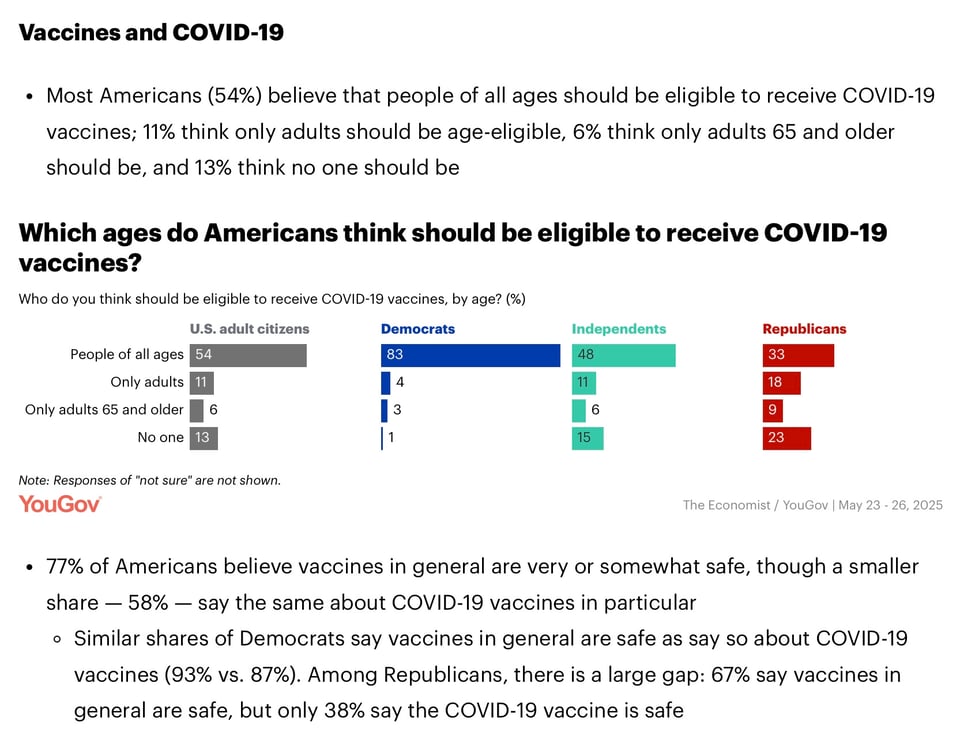Thursday, May 29, 2025. Annette’s Roundup for Democracy.
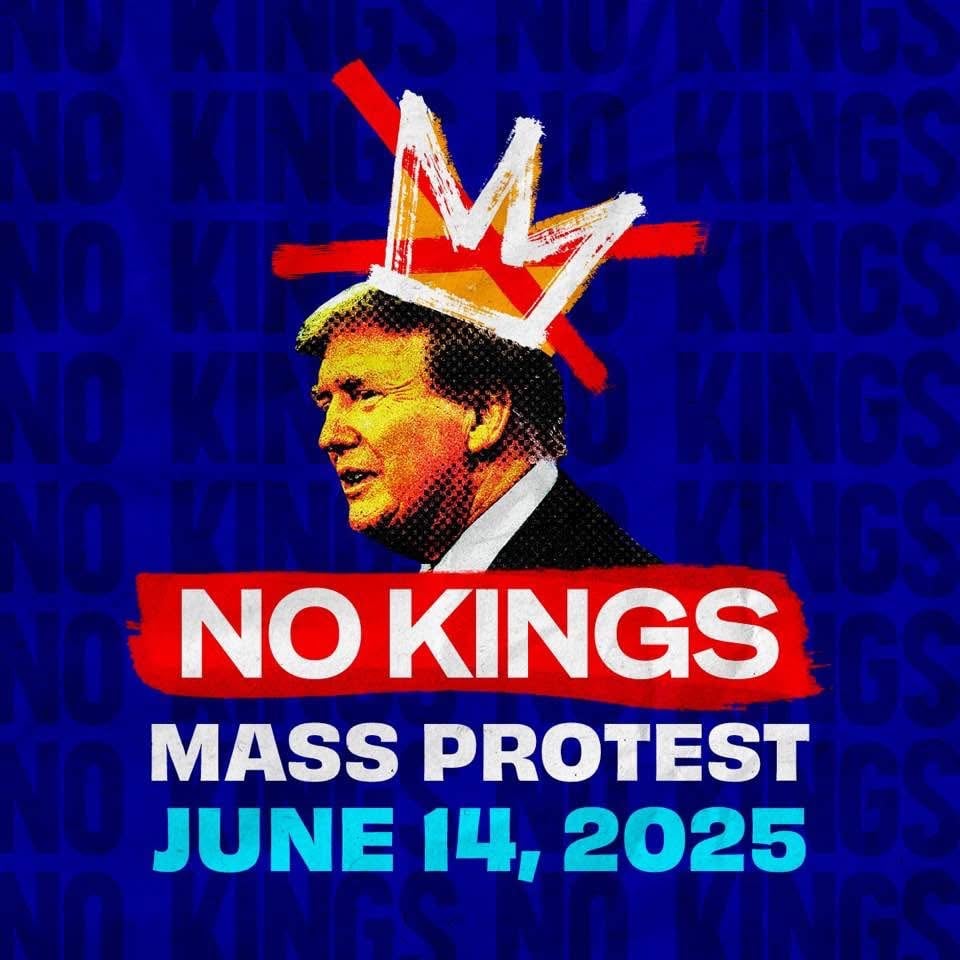
Out to lunch, dinner, breakfast and snacks.
The Executive-Orderer-in-chief doesn’t seem to know he has effectively stopped foreign student applicants from getting visas.
I don’t usually say this, but watch Trump.👇 Out to everything.
REPORTER: When could the administration resume interviews for foreign students visa?
— Aaron Rupar (@atrupar) May 28, 2025
TRUMP: On what?
REPORTER: Foreign student visas
TRUMP: For the French?
REPORTER: All the foreign students
TRUMP: What are you referring-- foreign visas for what? pic.twitter.com/ynKnbjQ0Xt
Big loss for Trump and his tariffs last night.
Federal court says President Trump doesn't have the power to impose tariffs unilaterally.
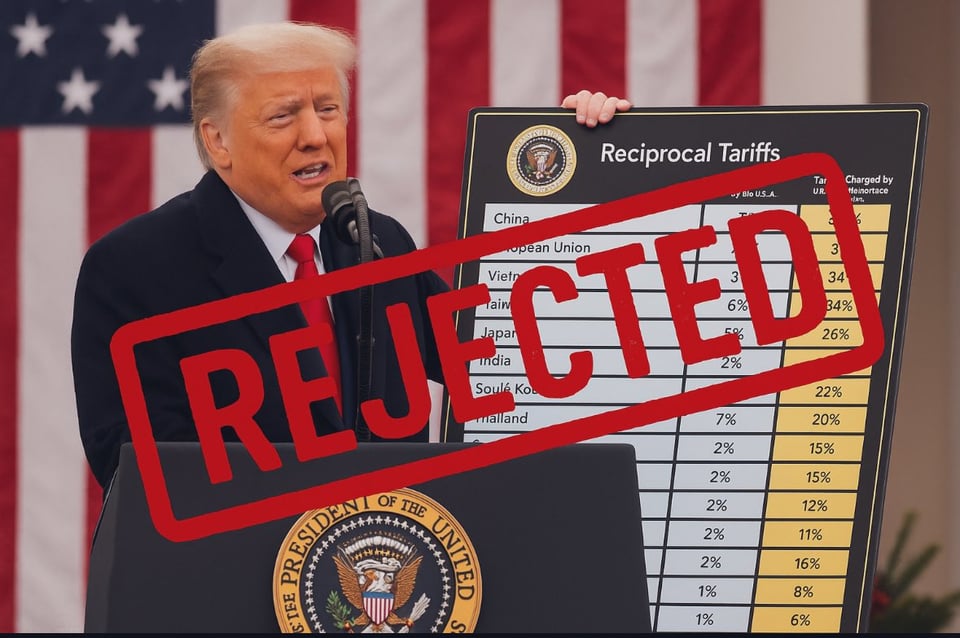
In a sweeping opinion, a three-judge panel of the New York-based Court of International Trade stuck down President Donald Trumps global tariffs as "contrary to law."
The judges found that the International Emergency Economic Powers Act -- which Trump used to enact his tariffs -- does not give him the "unlimited" power to levy tariffs like the president has in recent months.
"The Presidents assertion of tariff-making authority in the instant case, unbounded as it is by any limitation in duration or scope, exceeds any tariff authority delegated to the President under IEEPA. The Worldwide and Retaliatory tariffs are thus ultra vires and contrary to law," the judges wrote.
According to the judges, Congress, not the president, has the authority to impose tariffs under most circumstances, and Trumps tariffs do not meet the limited condition of an "unusual and extraordinary threat" that would allow him to act alone.
"Because of the Constitutions express allocation of the tariff power to Congress, we do not read IEEPA to delegate an unbounded tariff authority to the President. We instead read IEEPAs provisions to impose meaningful limits on any such authority it confers," the ruling said.
The Court of International Trade issued the decision across two cases -- one filed by a group of small businesses and another filed by 12 Democratic attorneys general.
The Trump administration can appeal the decision to the United States Court of Appeals for the Federal Circuit and then the Supreme Court.
Since Trump announced sweeping tariffs on more than 50 countries in April, his administration has faced half a dozen lawsuits challenging the president's ability to impose tariffs without the approval of Congress.
Lawyers for the small businesses alleged that the International Emergency Economic Powers Act -- which Trump invoked to impose the tariffs -- does not give the president the right to issue "across-the-board worldwide tariffs," and that Trump's justification for the tariffs was invalid.
"His claimed emergency is a figment of his own imagination," the lawsuit said. "Trade deficits, which have persisted for decades without causing economic harm, are not an emergency."
During a hearing earlier this month, a group of three judges -- who were appointed by presidents Obama, Trump and Reagan -- pushed a lawyer for the small businesses to provide a legal basis to override the tariffs. While a different court in the 1970s determined that the Trading with the Enemy Act of 1917 -- the law that preceded the International Emergency Economic Powers Act -- gave the president the right to impose tariffs, no court has weighed whether the president can impose tariffs unilaterally under the IEEPA.
During a May 13 hearing, Jeffrey Schwab, a lawyer from the conservative Liberty Justice Center representing the plaintiffs, argued that Trump's purported emergency to justify the tariffs is far short of what is required under the law.
"I'm asking this court to be an umpire and call a strike; you're asking me, well, where's the strike zone? Is it at the knees or slightly below the knees?" Schwab argued. "I'm saying it's a wild pitch and it's on the other side of the batter and hits the backstop, so we don't need to debate that."
The ruling marks the first time a federal court has issued a ruling on the legality of Trump's tariffs. In May, a federal judge in Florida nominated by Trump suggested the president has the authority to unilaterally impose tariffs, but opted to transfer the case to the Court of International Trade. (ABC News).
To quote Paul Krugman on Substack, Is There a Dignified Legal Way, Preferably in Latin, to Say "Holy Shit"? A court just threw out Trump's whole trade agenda.
Scott Pelley of 60 Minutes speaks out. Will CBS punish him? Will Trump?
Watch Scott Pelley’s remarks. He never mentions Trump.👇
Scott Pelley—American author and reporter for CBS News for more than 31 years, did not hold back pic.twitter.com/CqWlgRoy6W
— Olga Nesterova (@onestpress) May 27, 2025
This 👇 was breaking news last night.

Trump Shuts Down Paramount’s $15 Million Offer to Settle ‘60 Minutes’ Lawsuit | Report
President Donald Trump has shut down a $15 million offer from Paramount Global to settle his $20 billion lawsuit against CBS News, according to reporting from the Wall Street Journal.
The lawsuit stemmed from CBS’ “60 Minutes” interview with Kamala Harris last fall, which the president claims was deceitfully edited. Trump is asking for $25 million to settle and an apology from the news network, WSJ reports.
The two parties have reportedly discussed a tentative mediation session for Thursday.
The lawsuit and Paramount’s handling of it led to a mass exodus of many of the top members at “60 Minutes.” Executive producer Bill Owens resigned from his role in April. He said in a memo to the staff that he lost the ability to make independent decisions.
“My 60 Minutes priorities have always been clear. Maybe not smart, but clear. Over the past months, it has also become clear that I would not be allowed to run the show as I have always run it,” Owens wrote in a Tuesday memo to staff. “To make independent decisions based on what was right for 60 Minutes, right for the audience. So, having defended this show- and what we stand for – from every angle, over time with everything I could, I am stepping aside so the show can move forward. The show is too important to the country, it has to continue, just not with me as the Executive Producer.”
Wendy McMahon, a longtime defender of “60 Minutes,” also stepped down as president of CBS News and Stations among the tumult caused by the lawsuit. She said in a memo “it’s become clear the company and I do not agree on the path forward,” according to the New York Times.
Months into Trump’s term in office, the FCC opened investigations into the news practices at CBS News. The FCC also has to approve Paramount Global’s merger with Skydance – which is valued at $8 billion.
Paramount declined TheWrap’s request for comment. (The Wrap).
Do you want a list of criminals that Trump has embraced and pardon recently?
Okay, but briefly. Not counting the January 6 criminals.
President Trump has now pardoned 9 GOP Congressmen convicted of crimes: pic.twitter.com/85lPcJs5XD
— Jamie Dupree (@jamiedupree) May 28, 2025
Republicans against Trump
@RpsAgainstTrump
·
May 27. Trump’s latest batch of pardons includes:
✅ A sheriff who took $70,000 in bribes to appoint donors as deputies
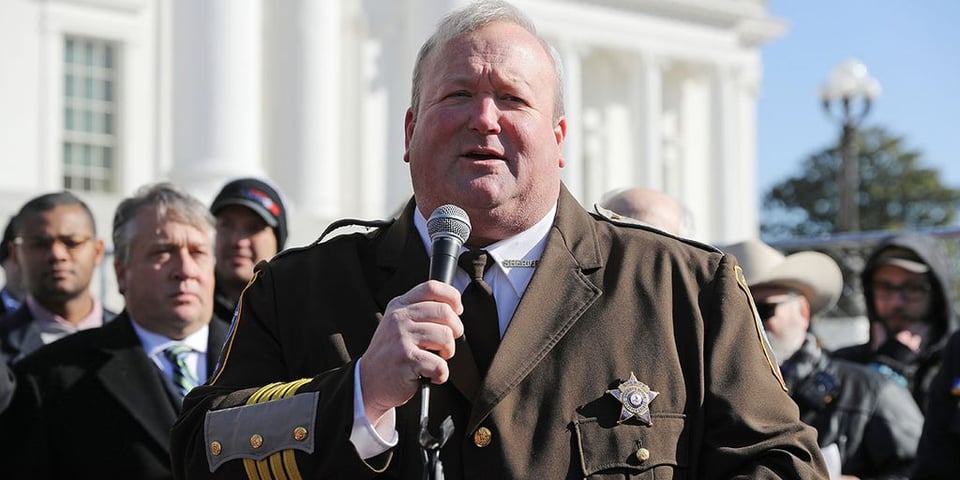
Scott Howard Jenkins, 53, of Culpeper, Virginia
✅ Reality TV stars convicted of serious financial fraud

Todd and Julie Chrisley, who were found guilty of conspiring to defraud banks and the IRS through tax evasion and bank fraud schemes.
✅ A millionaire who stole from nursing home staff whose mom is a major Trump donor

One commutation.
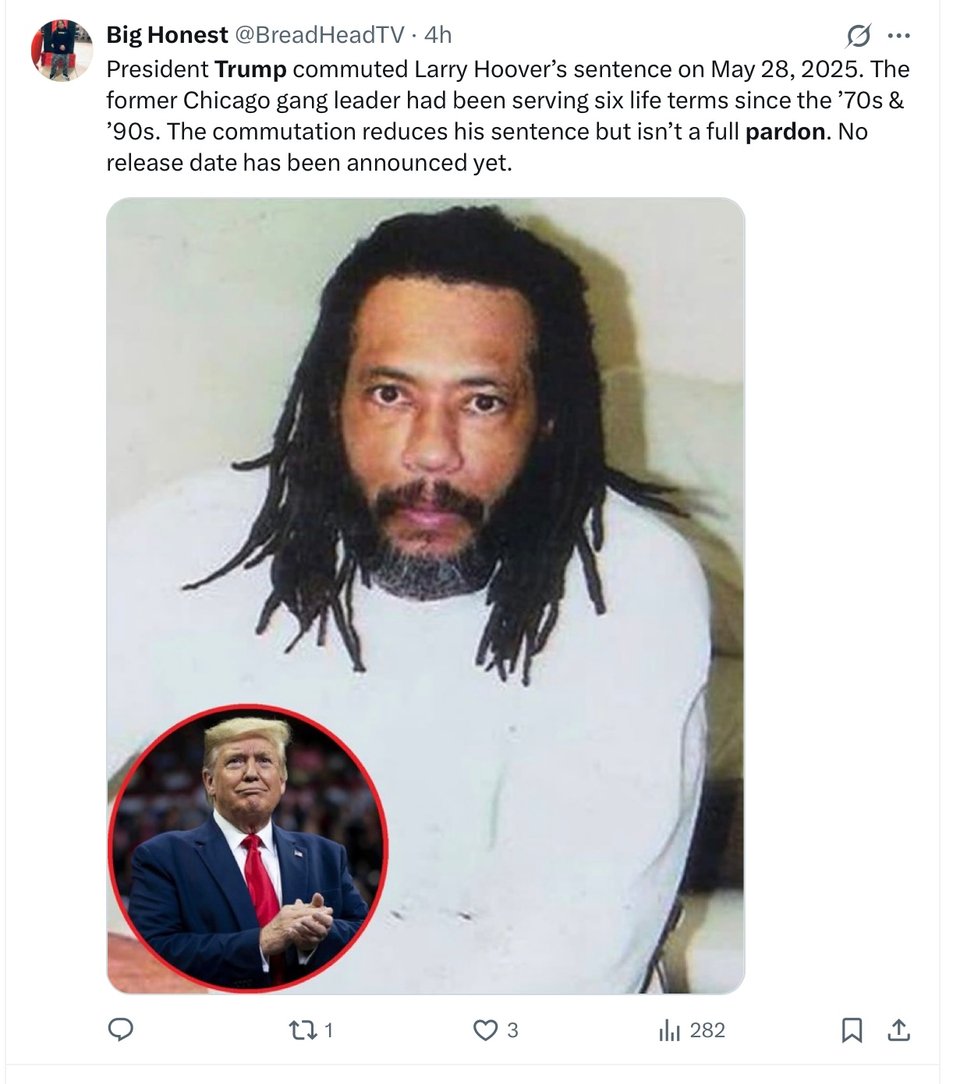
Trump promises more to come. Believe him.
Really American 🇺🇸
@ReallyAmerican1
·
BREAKING: In a shocking moment, Trump said he'll consider pardons for the men convicted of conspiring to kidnap Gov. Gretchen Whitmer, calling their conviction a "railroad job," and the men said some "stupid things."
Up to date, COVID news.
Eve and I anticipate we will have to go to Canada in the fall for up to date Covid shots.
What have you thought about this?
New COVID Variant NB.1.8.1 Found In US. What Are Its Symptoms?
As the United States emerges from a tough cold and flu season last the winter, there's one respiratory virus to still watch out for ahead of the summer: COVID-19. The country has historically seen surges in COVID during the warmer months, and this year should be no exception.
What's more, the virus that causes COVID-19, SARS-CoV-2, is still mutating. A highly contagious, mutated new variant called NB.1.8.1 has already been detected in several states, prompting concern among some experts.

Every year since the pandemic began in 2020, COVID cases have spiked in the U.S. between June and August. Last summer, the "FLiRT" variants drove a late summer surge across the country, the second-largest summer wave the U.S. has experienced since the pandemic began.
Many respiratory viruses, such as influenza and respiratory syncytial virus (RSV), follow predictable seasonal patterns, peaking around the same time during the fall and winter.
COVID-19, however, has no distinct season and can surge throughout the year at different times, per the U.S. Centers for Disease Control and Prevention.
"Over the last several years, there have been waves of COVID during the winter and in the late summer," Dr. William Schaffner, professor of infectious diseases at Vanderbilt University Medical Center, tells TODAY.com. "COVID trends look like a two-humped camel, so it comes up twice a year."
However, the timing and severity of COVID-19 waves can vary.
Last winter, the U.S. saw a "silent surge" of COVID around the holidays. After a lull, experts are warning that cases will likely rise again in the coming months — but that we may not be as prepared.
Public attitudes and the government's response to COVID have shifted. “People have become rather blasé about COVID-19," says Schaffner. The government stopped mailing out free at-home COVID-19 testing kits earlier this year, and new vaccination guidelines may limit access to shots in the fall.
Here's what to know about the new NB.1.8.1 variant and what to expect this summer, according to experts.
Will There Be a COVID Surge This Summer?
Experts predict that based on previous trends, there will be an uptick in COVID-19 cases this summer. “COVID may not have completely settled into a (predictable) yearly pattern yet, but it certainly has spiked the past four summers, and we anticipate that this will happen again this summer,” says Schaffner.
However, it's too soon to tell when the summer COVID-19 wave will peak and how severe it will be compared to past years.
The CDC no longer tracks the total number of new cases in the U.S., so wastewater data is an increasingly valuable tool to understand COVID trends, Marlene Wolfe, Ph.D,, principal investigator at WastewaterSCAN, tells TODAY.com.
We don’t see any significant upward trends happening yet, but we’ll continue to watch this closely,” says Wolfe. As of May 28, the levels of COVID-19 viral activity in wastewater are “low” nationally, according to CDC data.
COVID spreads during the summer due to several factors. The SARS-CoV-2 virus mutates easily and seems to adapt better to hot, humid weather than other respiratory viruses, the experts note.
Population immunity, either from vaccination or previous infection, also tends to wane by the summer, Andy Pekosz, Ph.D., professor of molecular microbiology and immunology at the Johns Hopkins Bloomberg School of Public Health, tells TODAY.com.
“The longer we get from the last surge or the last vaccination campaign, the more people are susceptible," says Pekosz.
Uptake of the 2024-2025 COVID vaccine has been relatively low. As of April 26, only 23% of adults had received the shot, per the CDC.
“So summer will be a time when the population is sort of ripe for another wave of COVID,” Pekosz adds.
Another factor in summer COVID spread is the increase in travel and social gatherings in indoor, air-conditioned spaces. And in the past, summer surges of COVID-19 have usually been partly due to the emergence of new variants, the CDC says.
Currently, the variants circulating in the U.S. are descendants of JN.1, an omicron strain that emerged last summer, says Pekosz. As of May 28, the LP.8.1 variant is driving 70% of infections in the U.S., per CDC data.
However, a new variant is drawing attention.
What is the New COVID Variant, NB.1.8.1?
A highly infectious variant called NB.1.8.1 has been detected in several states in the U.S, including California, Ohio, Rhode Island, Virginia, and New York City, according to the Global Initiative on Sharing All Influenza Data (GISAID) database.
The first cases were picked up earlier this spring through airport screening programs for international travelers.
NB.1.8.1 recently caused large COVID surges in China and other parts of Asia, Michael Hoerger, Ph.D., associate professor at Tulane University School of Medicine, tells TODAY.com.
On May 23, the World Health Organization designated NB.1.8.1 a “variant under monitoring” due to its global spread and mutations, which may increase its transmissibility.
NB.1.8.1 is a recombinant of XDV.1.5.1, per the WHO. It's similar to the dominant LP.8.1 variant, but has additional spike protein mutations, which could affect its ability to evade immunity.
Just like other omicron strains, NB.1.8.1 is highly contagious, but it's too soon to tell if it's more transmissible than other variants.
So far, there have been too few sequences of NB.1.8.1 in the U.S. for the variant to be added to the CDC’s variant dashboard. “It’s still in the early stages of emergence,” Pekosz adds.
A decline in testing and sequencing is making it harder to track new variants in real time. "We don’t have the same wealth of information that we had early in the pandemic," says Wolfe.
It’s unclear whether NB.1.8.1 will become widespread the in the U.S. or drive a summer wave. “If it does take off here, it may affect the timing of the summer peak, causing it to come earlier ... but COVID is unpredictable, so that's my best guess,” Hoerger adds.
Is NB.1.8.1 more severe?
So far, there's no evidence that NB.1.8.1 causes more serious illness. "Current data do not indicate that this variant leads to more severe illness than other variants in circulation," the WHO said.
The global risk posed by NB.1.8.1 is considered “low,” the WHO said.
Although omicron strains like NB.1.8.1 are very contagious, they don’t seem to lead to more hospitalizations compared to earlier variants. “These newer variants tend to cause a substantial amount of mild infection,” says Schaffner, adding that this is partly due to high population immunity.
“Over 90% of people living in the U.S. have had previous experience with COVID,” says Schaffner.
Hoerger adds that NB.1.8.1 is "something we should be keeping an eye on, but it's hard to say what the effect will be in the United States."
Symptoms of NB.1.8.1 COVID Variant
The symptoms of the new NB.1.8.1 variant are similar to other newer omicron variants. According to the CDC, common COVID symptoms include:
Cough
Sore throat
Congestion or runny nose
Fatigue
Fever or chills
Headache
Body aches
Shortness of breath
Diarrhea
Loss of sense of taste or smell
Symptoms can vary from person to person.
People of all ages can still get very sick with COVID-19, but some groups are more likely to develop severe illness, per the CDC. These include people over the age of 65, newborn infants, and people who are immunocompromised or have underlying medical conditions.
"The risk of long COVID, as far as we know, also continues to increase every time someone gets infected," says Hoerger.
Should You Get a COVID Vaccine?
The COVID vaccine helps protect people from severe illness, hospitalization and death.
The current 2024-2025 COVID-19 vaccines, released last fall, target either the JN.1 variant or its descendant, KP.2. These shots are still available and recommended for people ages 6 months and older, the CDC says on its website.
Ahead of a potential summer surge, should you get a booster? "I would recommend that anyone who has not been vaccinated recently get vaccinated if they can," says Hoerger.
"People at high risk are recommended to get a pre-summer COVID vaccine in addition to the one that precedes the winter rise (in the fall)," says Schaffner.
Additionally, new guidelines may make it harder for certain groups to get the new COVID vaccines this fall.
The updated COVID vaccines for 2025–2026 will target the LP.8.1 strain, the Food and Drug Administration announced last week, which differs from the FDA vaccine advisory committee's recommendation to stick to the strains used in the current shots.
The new COVID vaccines for healthy children and adults will have to go through clinical trials before they can get approved, which could take about a year, NBC News reported. The new shots should still be available this fall for people over 65 or with medical conditions.
The CDC also no longer recommends routine COVID vaccines for healthy children and pregnant women, Health and Human Services Secretary Robert F. Kennedy Jr. announced on May 27. However, many obstetricians and pediatricians disagree with this change, which could affect insurance coverage of the shots.
If you have questions about COVID-19 vaccines, talk to your doctor.
How to Prevent COVID-19
When COVID cases rise, people can take simple actions to protect themselves and their families from COVID-19. "It's important to be prepared,” says Schaffner.
The experts recommend taking the following steps to prevent infection and avoid spreading COVID-19 to others:
Stay up to date on COVID vaccinations.
Test if you have COVID symptoms
Test if you have a known exposure.
Stay home when you're sick.
Wear an N95 mask in crowded, indoor spaces.
Practice social distancing.
(Today.com)
From the new Economist/YouGov poll.
